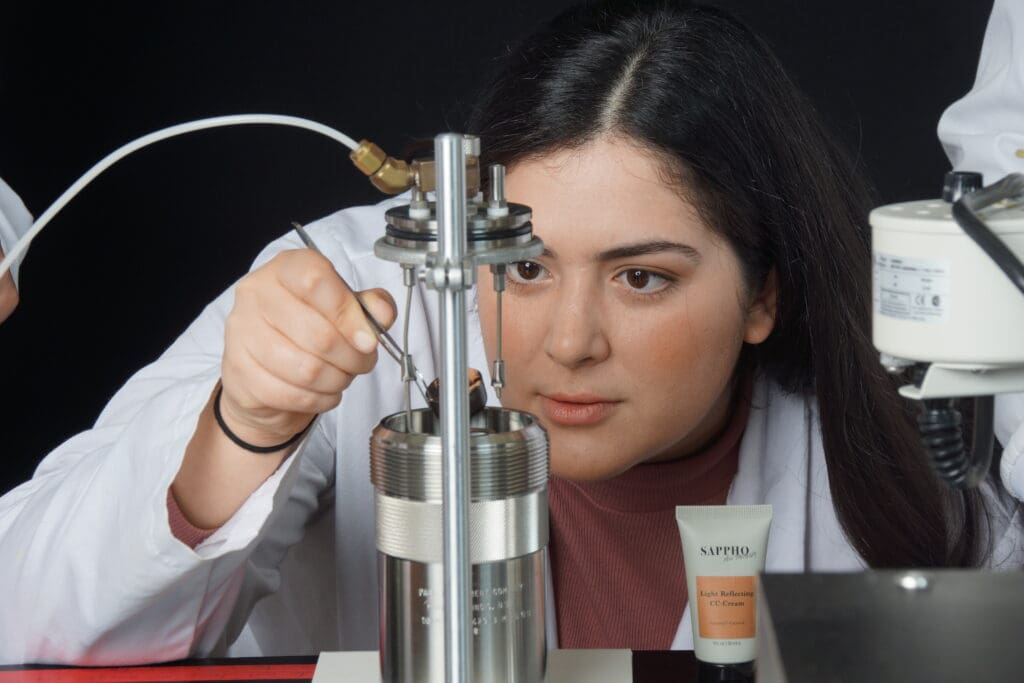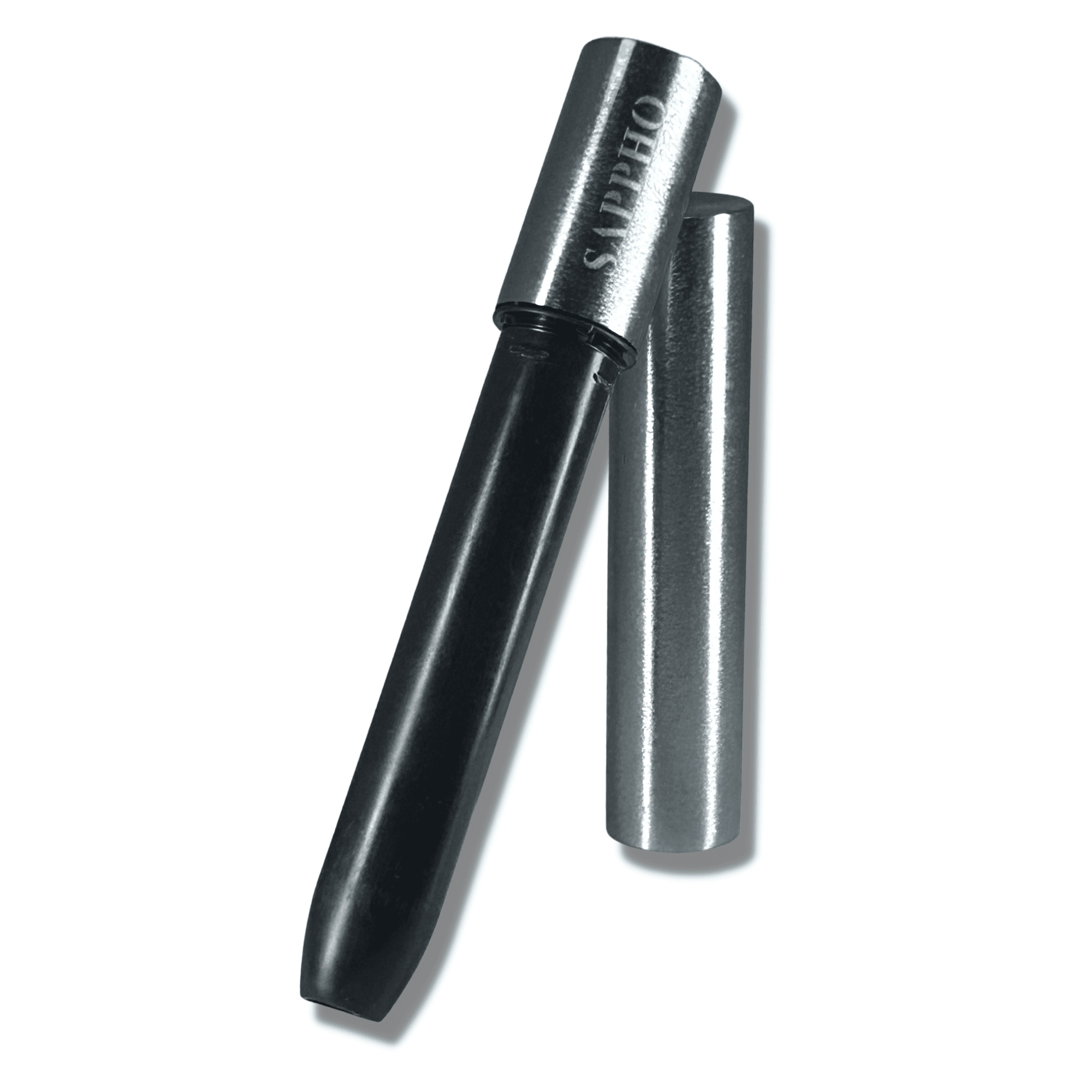Canadian vegan cosmetics brand SAPPHO New Paradigm is launching its latest product, a per-and polyfluoroalkyl substances (PFAS)-tested refillable and reusable mascara, leading the charge toward environmental change with the PFAS-tested inside-and-out product. Ensuring that the mascara is not only safe for consumers but also eco-friendly, SAPPHO is collaborating with the British Columbia Institute of Technology (BCIT) to protect consumers and the environment by learning more about PFAS chemicals. We spoke with SAPPHO founder JoAnn Fowler to learn more. —Vita Daily

Hi JoAnn! Please tell us a bit about yourself to start.
My first career was in social services, working as a Child Care Counsellor for emotionally challenged children. At 30, I became a makeup artist in film and worked in the field for 25 years, garnering an Emmy nomination and a Leo award for my work.
When and why did you launch SAPPHO New Paradigm? What niche were/are you aiming to fill?
l launched SAPPHO New Paradigm in 2016, after losing my home and life savings to a potential investor that turned out to have a very dissimilar idea regarding the use of ingredients, messaging and authenticity in my first makeup line, Sappho Cosmetics. I was and still am trying to create a niche where transparency/safety of ingredients, beautiful formulations, inclusivity and diversity, as well as sustainable packaging and practices are company pillars.
What products do you currently offer, and what makes them unique?
Right now, SAPPHO offers natural foundation, concealer and mascara made in Canada that have all tested undetected under 10 ppm for Organic fluorine (or PFAS), the smallest level that can currently be found. These are high-quality vegan cosmetics suitable for any skin type that are made for daily wear, on or off camera, for people that love a natural, weightless feel. We are also clearing out other products that have tested unfavourably, and part of our work is figuring out why, and creating new, innovative, organic fluorine-free formulations to replace them. Along with this, we offer a very popular line of cruelty-free pro makeup brushes made from FSC wood handles and vegan bristles.
You’re now launching a per-and polyfluoroalkyl substances (PFAS) tested refillable and reusable mascara, in collaboration with the British Columbia Institute of Technology (BCIT).
The launch of the PFAS-tested refillable mascara is somewhat separate from our collaboration with BCIT, which we’ve been working on for over 18 months, and stands as an example of what is possible to accomplish with proper testing. We had the mascara and packaging components checked for Organic fluorine by a lab in the United States, and in fact, it took the production of four wands to find one that tested undetected <10 ppm for Organic fluorine/PFAS. The students at BCIT are using our previously analyzed products as benchmarks from which to start to develop their testing protocols.
Can you tell us more about the product, project and partnership?
The Maximum Intensity Refillable Mascara is arriving this June and offers an award-winning formula that is vegan and PFAS (Organic fluorine) tested, with results undetected <10 ppm. It is a gentle, water-based mascara that is buildable and deeply pigmented, and it’s been a bestseller for us since 2016. The new packaging is now refillable, which means that consumers can keep using their beautiful metal case and refill it with a new mascara cartridge as needed. The best part is that it makes beauty more sustainable, because the usual mascara tubing that is normally attached to the outside is now detachable, rendering it recyclable by not being fused to other plastics or to metal. However, it is not yet zero waste as no cosmetics tubes of any kind are taken by most conventional recycling places, mainly because tubes cannot be cleaned out easily and the leftover product often gums up recycling machinery. There is also the fear of contamination for repurposing hard to clean plastic tubes from toxic chemicals used in many conventional, and even some ‘clean’, beauty lines. SAPPHO does not have to worry about our thoroughly tested formulas leaching chemicals into our bodies or our Earth. To ensure the recycling of our mascara refill cartridges, we have joined Pact Collective, a non-profit organization that deals exclusively with hard-to-recycle beauty packaging. Consumers can mail or drop off their SAPPHO empties for proper waste processing. Working with BCIT on developing Organic fluorine testing protocols for cosmetics means the gold standard of tests to detect PFAS markers in our products could become available to us here in Canada. No other lab I’ve reached out to can offer us this testing method locally, so how could we affect real change and achieve transparency for Canadians? We had to find progressive people working for an institution that embraces innovation and favours collaborating with industry, and we found that with the team at BCIT’s Chemical and Environmental Technology department. There are currently four incredible women working on this capstone project, who want to make sure we all have access to truly safe Canadian-made cosmetics that are free of PFAS.
How are you personally involved with the BCIT students? What sort of process are they working to develop that will help your brand be more eco-friendly?
My team and I had consulted with Dr. Lynch regarding questions about sustainability in the past, and when we realized the large scope of the work that needed to be done regarding PFAS in cosmetics, we went to her with our products and a wish to find a way to test in Canada. I met with the professor and her students to discuss what needed to be done. We offered up products that tested undetected and some that didn’t. We did so to find out which elements of the formulas or packaging are causing detected PFAS – it’s important to know they were never added intentionally in our case. We’re hoping by doing so to start the process of mitigating and eliminating their presence across the entire supply chain. That begins with having access to the right test available for cosmetics, but eventually, these protocols could extend beyond beauty products and be utilized in many other industries plagued by these hormone-disrupting chemicals, helping to protect consumers and the environment. Many PFAS not only accumulate in our bodies causing a variety of health issues, but they also accumulate in nature. It’s about harm reduction at this point, and SAPPHO & BCIT are working together to do our part as best as we can, to offer makeup products that don’t add to the existing problem.

Be the first to comment